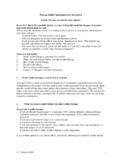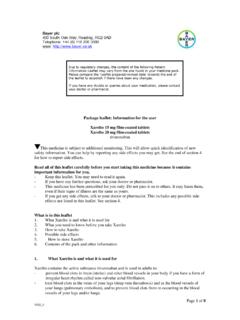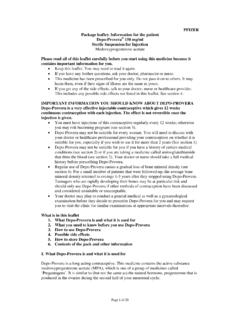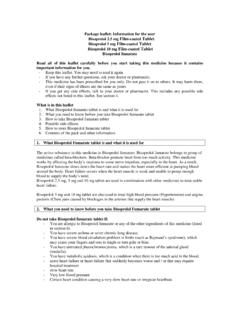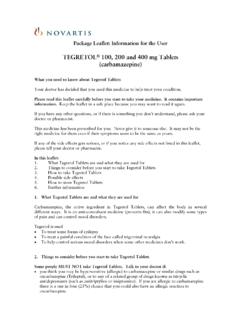Transcription of PACKAGE LEAFLET: INFORMATION FOR THE USER …
1 PACKAGE leaflet : INFORMATION FOR THE user . ibuprofen 400 mg film-coated tablets ibuprofen Read all of this leaflet carefully before you start taking this medicine because it contains important INFORMATION for you. Keep this leaflet . You may need to read it again. If you have any further questions, ask your doctor or pharmacist. This medicine has been prescribed for you only. Do not pass it on to others. It may harm them, even if their signs of illness are the same as yours. If you get any side effects, talk to your doctor or pharmacist. This includes any possible side effects not listed in this leaflet . See section 4. What is in this leaflet 1. What ibuprofen tablets is and what it is used for 2. What you need to know before you take ibuprofen tablets 3. How to take ibuprofen tablets 4. Possible side effects 5. How to store ibuprofen tablets 6. Contents of the pack and other INFORMATION 1.
2 What ibuprofen tablets is and what it is used for ibuprofen tablets belong to a group of medicines called NSAIDs (non-steroidal anti-inflammatory drugs). ibuprofen tablets reduces fever, relieves pain and has an anti-inflammatory effect. In adults and children over 12 years (>40 kg): Short term treatment of fever and pain of mild to moderate intensity, including dysmenorrhea. Long term symptomatic treatment of pain and inflammation in chronic inflammatory rheumatic diseases. 2. What you need to know before you take ibuprofen tablets Do not take ibuprofen tablets: if you are allergic (hypersensitive) to ibuprofen or any of the other ingredients of this medicine (listed in section 6). if you are in the last three months of pregnancy. if you have an increased tendency to bleed. if you have severe liver and kidney disease. if you have severe heart failure or coronary heart disease.
3 If you have a stomach ulcer, duodenal ulcer, or if you have had a stomach ulcer or duodenal ulcer previously when treated with ibuprofen or a similar product. if you have experienced allergic reactions ( breathing difficulties, nasal obstruction, rash) to acetylsalicylic acid or other anti-inflammatory drugs. If you are suffering from bleeding on the brain (cerebrovascular bleeding) or other active bleeding. if you are suffering from significant dehydration (caused by vomiting, diarrhoea or insufficient fluid intake). Warnings and precautions: Anti-inflammatory/pain-killer medicines like ibuprofen may be associated with a small increased risk of heart attack or stroke, particularly when used at high doses. Do not exceed the recommended dose or duration of treatment. You should discuss your treatment with your doctor or pharmacist before taking ibuprofen tablets if you: - have heart problems including heart failure, angina (chest pain), or if you have had a heart attack, bypass surgery, peripheral artery disease (poor circulation in the legs of feet due to narrow or blocked arteries), or any kind of stroke (including mini-stroke' or transient ischaemic attack TIA ).
4 - have high blood pressure, diabetes, high cholesterol, have a family history of heart disease or stroke, or if you are a smoker. Always aim for the lowest possible dose and shortest possible treatment time to reduce the risk of side effects. It is generally the case that higher than recommended doses can entail risks. This also means that the combination of several NSAID products at the same administration time should be avoided. People who have or have had the following illnesses or symptoms should consult a doctor before starting treatment with ibuprofen tablets: systemic lupus erythematosus (connective tissue disease), impaired kidney or liver function, mild to moderate heart failure, asthma, inflammatory bowel diseases, previous stomach ulcer or other increased tendency to bleed. Like other anti-inflammatory drugs, ibuprofen tablets can mask signs of infection.
5 This product belongs to a group of medicines (NSAIDs) which may impair the fertility in women. This effect is reversible on stopping the medicine. Patients who have previously had gastrointestinal tract problems, especially elderly patients, should contact a doctor in the event of abdominal symptoms, particularly at the start of treatment. Serious skin reactions have been reported in very rare cases when using a NSAID. Patients seem to be at highest risk early in the course of therapy, the onset of the reaction occurring in the majority of cases in the first month of treatment. Stop taking ibuprofen tablets and contact a doctor if you develop a rash or mucous membrane lesions. In patients with Systemic lupus erythematosus and mixed connective tissue disorders there may be an increased risk of aseptic meningitis. Stop taking ibuprofen tablets and contact a doctor immediately if you develop any of the following symptoms (angioedema).
6 Swelling of the face, tongue or throat, difficulties swallowing, hives and difficulties breathing. Medicines like ibuprofen tablets may entail a slightly increased risk of heart attack or stroke. This increased risk is more likely when using high doses and in long-term treatment. Do not exceed the recommended dose or treatment time. Consult a doctor or pharmacist about your treatment if you have heart problems, if you previously have had a stroke or if you think that you have an increased risk for these conditions (for example, if you have high blood pressure, diabetes, high cholesterol levels or if you smoke). Do not take ibuprofen tablets if you are planning a pregnancy. Consult your doctor first. During varicella it is advisable to avoid use of this drug. Serious skin reactions have been reported in very rare cases when using a NSAID. Stop taking ibuprofen tablets and contact a doctor if you develop a rash or mucous membrane lesions.
7 The severe rashes may include blisters on the skin, especially on the legs, arms, hands and feet which can also involve the face and lips (erythema multiforme, Stevens-Johnson s syndrome). This can get even more severe, where the blisters get larger and spread out and parts of the skin may slough off (toxic epidermal necrolysis). There may also be severe infection with destruction (necrosis) of skin, subcutaneous tissue and muscle. ibuprofen tablets may cause a reduction in the number of white blood cells and your resistance to infection may be decreased. If you experience an infection with symptoms such as fever and serious deterioration of your general condition, or fever with local infection symptoms such as sore throat/pharynx/mouth or urinary problems you should see your doctor immediately. A. blood test will be taken to check possible reduction of white blood cells (agranulocytosis).
8 It is important to inform your doctor about your medicine. If you have been told by your doctor that you have intolerance to some sugars. Children and adolescents There is a risk of renal impairment in dehydrated children and adolescents. Other medicines and ibuprofen tablets: Do not use different types of pain-relieving medicines at the same time unless directed by a doctor. Tell your doctor or pharmacist if you are taking or have recently taken or might take any other medicines, including medicines obtained without a prescription. ibuprofen tablets may affect or be affected by some other medicines. For example: - tumours and immune system disorders (methotrexate, tacrolimus, ciclosporin, pemetrexed), - manic depressive illness (lithium), - irregular heart beat (digoxin), - pain (acetylsalicylic acid), - medicines that are anti-coagulants ( thin blood/prevent clotting aspirin/acetylsalicylic acid, warfarin, ticlopidine, dicumarol), - depression (medicines called SSRIs), - medicines that reduce high blood pressure (ACE-inhibitors such as captopril, beta-blockers such as atenolol medicines, angiotensin-II receptor antagonists such as losartan).
9 - inflammation (corticosteroids). - fungal infections (antifungals particularly voriconazole or fluconazole). - diabetes mellitus (sulphonylureas). - human immunodeficiency virus (HIV) infection (zidovudine, ritonavir). - antibiotic (quinolones such as ciprofloxacin). - aminoglycosides (a type of antibiotic). - mifepristone - probenecid - any other ibuprofen preparations, such as those you can buy without a prescription - any other anti-inflammatory pain killer, including acetylsalicylic acid - cholestyramine (a drug used to lower cholesterol). - Gingko biloba herbal medicine (there is a chance you may bleed more easily if you are taking this with ibuprofen ). For this reason, the doctor treating you needs to know about all the medicines you are taking. Some other medicines may also affect or be affected by the treatment of ibuprofen tablets. You should therefore always seek the advice of your doctor or pharmacist before you use ibuprofen tablets with other medicines.
10 ibuprofen tablets with food and drink ibuprofen tablets could be used together with food and drinks. Pregnancy, breast-feeding and fertility If you are pregnant or breast feeding, think you may be pregnant or are planning to have a baby, ask your doctor or pharmacist for advice before taking this medicine. Pregnancy Pregnant women should not use ibuprofen tablets during the three final months of the pregnancy. Use of ibuprofen tablets should be avoided by women who are planning a pregnancy or are pregnant. Treatment at any time in pregnancy should only take place as directed by a doctor. Breast-feeding ibuprofen tablets passes into breast milk. The use of ibuprofen tablets is therefore not recommended while breast-feeding. However, consult a doctor if using ibuprofen tablets more than occasionally while breast-feeding is required. Fertility The use of ibuprofen tablets may affect fertility.



